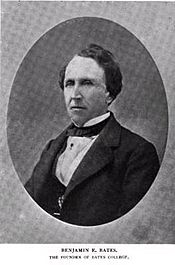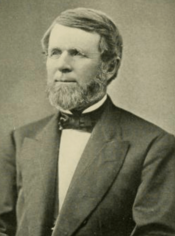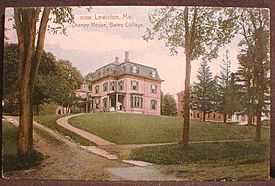Oren Burbank Cheney facts for kids
Quick facts for kids
Oren Burbank Cheney
|
|
|---|---|
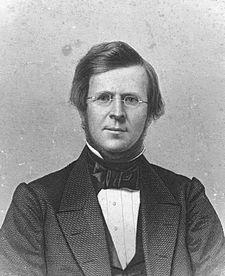 |
|
| 1st President of Bates College | |
| In office March 16, 1855 – March 1, 1894 |
|
| Succeeded by | George Colby Chase |
| Member of the Maine House of Representatives from the 86th district | |
| In office December 12, 1851 – November 3, 1852 |
|
| Preceded by | Ephraim K. Smart |
| Succeeded by | Israel Washburn |
| Constituency | Augusta, Maine, U.S. |
| Personal details | |
| Born | December 10, 1816 Holderness, New Hampshire, U.S. |
| Died | December 22, 1903 (aged 87) Lewiston, Maine, U.S. |
| Resting place | Riverside Cemetery Lewiston, Maine, U.S. |
| Political party | Liberty Party 1842-1850 Free Soil Party 1851-1853 Republican Party 1854-1903 |
| Spouses |
Caroline A. Rundlett
(m. 1840; death 1846)Nancy S. Perkins
(m. 1847; death 1886) |
| Relations | Person & Elisas Hutchins Cheney (brothers) |
| Parents | Abigail and Moses Cheney |
| Alma mater | Dartmouth College |
| Occupation | Abolitionist, university founder, state representative |
| Signature |  |
| He served as president at the college's founding, although there is a discrepancy with its founding date. | |
Oren Burbank Cheney (December 10, 1816 – December 22, 1903) was an important American leader. He was a politician, a minister, and a statesman. Cheney was a key figure in the movement to end slavery in the United States during the 1800s.
He worked with Benjamin Bates to create Bates College. This was the first college where both boys and girls could study together in New England. Many people consider this college his greatest achievement. Cheney is known for speaking out against slavery and for supporting fairness, equality, and personal freedom.
Cheney strongly believed in equality for all people. He often spoke out against racial unfairness, social snobbery, and poverty. He became a minister when he was young. In the 1840s, he helped enslaved people escape to freedom. This was against the law at the time. His community work led to him being elected to the Maine House of Representatives.
As a politician, Cheney supported reducing alcohol use. He also helped fund his first school, the Lebanon Academy. He gave many speeches against slavery, even though some people strongly disagreed. After his political career, he continued to fight against slavery through his newspaper. He then founded the Maine State Seminary, which later became Bates College. He was the first President of Bates College for almost 40 years.
Contents
Early Life and Family
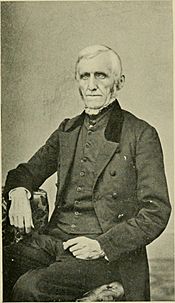
Oren Cheney's father, Moses Cheney, was a minister and abolitionist.
|
Birth and Childhood
Oren Burbank Cheney was born in Holderness, New Hampshire, on December 10, 1816. His parents, Abigail and Moses Cheney, were known for being against slavery. Oren's brother, Person, became a famous politician in New Hampshire.
His father worked in a paper factory and helped people escape slavery through the Underground Railroad. Moses Cheney also held important church positions and served in the state government. Oren's mother greatly influenced his religious beliefs. He often said his mother taught him about faith. His home was very religious, and he believed his upbringing shaped his ideas.
As a child, Oren was known for being "humble, patient, and soft-spoken." At age eight, he started Sunday School. His parents were criticized for sending him to a new school. He began working at the school at age nine. He spent his earnings on treats like honey and gingerbread.
Oren also had a rebellious side. Once, a teacher came to his house, and Oren scared everyone by stabbing the windowsill with his jack-knife. This gave him a reputation as a mischievous boy. Soon after, he worked at his father's paper mill. He tended machines and helped with cleaning at night. The paper he made was used to print The Morning Star. This was a very important newspaper for the Free Will Baptist church.
Education and Ministry
At age thirteen, Oren attended the New Hampton Academical and Theological Institute. This school was five miles from his home. His mother sent him there partly because of his interest in knives. He had cut his thumb while husking corn. Oren quickly developed a demanding personality. He taught at elementary schools while studying at New Hampton. Once, a parent caused a disturbance at the school. Cheney stood his ground and quieted the man.
While at New Hampton, he learned more about Free Will Baptism. After the paper mill became successful, Cheney was sent to Parsonsfield Seminary. This school was 14 miles away, a three-day trip.
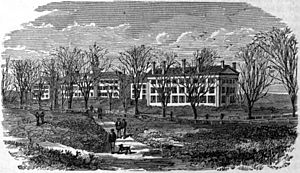
At Parsonsfield, he saw racial separation and religious unfairness. Later in life, he wanted to create a school that welcomed everyone. He was interested in the temperance movement early on. He even started his school's temperance society.
In 1836, Cheney enrolled in Brown University. But he saw violent protests there. He decided to transfer to Dartmouth College because they were more accepting of anti-slavery ideas. His choice was also influenced by a famous court case, Dartmouth College v. Woodward. This case later helped guide the founding of Bates College.
He accepted a teaching job in Canaan, New Hampshire. But his goals were stopped when townspeople moved the school building into a swamp. Cheney enrolled at Dartmouth in 1836. He started a group that helped educate Native Americans. He felt a strong connection to Dartmouth. He often meditated near the grave of Eleazar Wheelock, the college's founder.
While at Dartmouth, he went to many anti-slavery meetings. He described how people cheered for the anti-slavery movement. In May 1836, he walked 40 miles to his old home to be baptized. He walked because he didn't have much money. On his way back to Dartmouth, he focused on teaching. He earned money by teaching jobs around New Hampshire. He graduated from Dartmouth in 1839.
He returned to Parsonsfield, a stop on the Underground Railroad, in the 1840s. He became the head master of the school. In 1850, he founded the Lebanon Academy in Lebanon, Maine. During this time, he worked for the Underground Railroad. He and his brother, Elias Hutchins, helped enslaved people escape from New Hampshire. This was very risky under the federal Fugitive Slave acts.
His reputation led to a visit from Frederick Douglass, a famous abolitionist. Douglass stayed at Cheney's home during an anti-slavery convention.
On January 30, 1840, Oren married Caroline A. Rundlett. They had one child, Horace Rundlett Cheney. He later studied theology at the Free Will Baptist Bible School. But he had to leave after his wife died in June 1846. In 1844, Cheney became a Free Will Baptist minister. But he left the ministry because of their stance on slavery. In 1847, he married Nancy S. Perkins. They had two children, Caroline and Emeline. Nancy died in 1886. In 1892, Cheney married Emeline S. Burlingame, who survived him. His only son, Horace Cheney, attended Bowdoin College.
Political Career and Activism
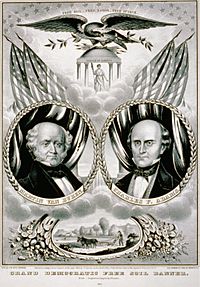
Cheney's political journey began early. His first official vote was for James G. Birney, a member of the Liberty Party. Birney lost, but a year later, Cheney was nominated for the Maine House of Representatives without his knowledge. He won the election in December 1851. While traveling, he was told he had been elected. He was sworn in as a representative for Augusta that same day.
Early in his time in the legislature, he focused on stopping the sale of alcohol in Maine. He helped pass the Maine Liquor Law. He also began giving speeches in the legislature about ending slavery and equality. These speeches received mixed reactions. When a congressman asked him to stop, Cheney famously replied that nothing could make him stop speaking on those topics.
During his time as a state representative, he took over his father's newspaper, The Morning Star. He used the newspaper to print his speeches and write articles supporting the end of slavery. His ownership of the newspaper caught the attention of Frederick Douglass. Cheney wrote in his first issue as owner: "We shall speak against slavery... We hate it... as a giant sin against God."
Later, in the Maine House of Representatives, he secured $2,000 for his academy in Lebanon. He also worked to control alcohol sales and promote temperance. He left his academy in good financial shape, cared for by the local community.
Before his term ended, he was chosen as a delegate for the 1852 Free Soil Party Convention in Pittsburgh, Pennsylvania. At the convention, he caused a stir with his speech calling for the complete end of slavery. At that time, the Free Soil Party only believed in stopping slavery from spreading, not ending it everywhere.
One evening, at a local tavern, the owner refused to serve Frederick Douglass because he was Black. Cheney stepped forward and firmly insisted that Douglass be served first. Fearing trouble and loss of business, the owner agreed. This event sent a powerful message to the convention.
In 1853, he was a delegate to the Free Will Baptist General Conference. He helped connect the church to the political movement. He decided not to seek another term in the Maine Legislature. This was because his efforts to give Black people more rights were not successful enough. After leaving office on November 3, 1854, he continued his work with The Morning Star.
He changed his political affiliation to the Republican Party. This was because of their stance on slavery and individual freedom. He spent the rest of his life helping the party grow in Maine.
Founding Bates College
After hearing that his old school, Parsonsfield Seminary, was destroyed in 1853, Cheney began planning a new school. It was believed that opponents of his anti-slavery work were behind the destruction. Cheney wrote in his diary about the fire.
Cheney returned to the Maine State Legislature. He used his influence to start the process of creating a new school. He met with important people in Maine to discuss forming a new seminary. His idea was well-received. Twenty-four petitions were sent to the Maine State Legislature. The charter was approved quickly, and $15,000 was given to start the school. Cheney wrote to Charles Sumner, a Massachusetts Congressman and anti-slavery leader. He asked for a motto for the university. Sumner replied with "Amore ac Studio," which means "with ardor and devotion" or "with love of learning."
Construction of the school began in Parsonsfield. However, a wealthy textile businessman named Benjamin Bates became interested in the project. He convinced Cheney to build the school in Lewiston. Lewiston was a growing town where Bates had successful mills. The college moved to Lewiston and was officially named the Maine State Seminary on March 16, 1855.
The school's founding documents mentioned other Maine colleges, Bowdoin and Colby College. Cheney wanted his new school to be different. He wrote that they aimed for a higher level of education than an academy but not quite a traditional college. He was determined to get state support for it.
The Maine State Seminary was founded on the ideas of equality and strong academics. It opened in 1865 with 137 students. The school became known for its high academic standards. It also educated working-class people in Maine. The college was very different from Bowdoin College because it promoted equality for all. However, the relationship between the two colleges was complex. Cheney also served as an overseer for Bowdoin College from 1860 to 1867. In 1860, Cheney gave a speech to the first graduating class of 15 male students. He emphasized making an "impact in a changing world."
Benjamin Bates began to give a lot of money to the college. He was impressed by its growing reputation and values. He gave Cheney $50,000 to start. By the end of his life, Bates had contributed almost $300,000.
Cheney was very grateful for Bates's financial support. He asked the Seminary board to rename the college in his honor. Bates College was officially chartered on March 16, 1864. Cheney made sure that admission to Bates was strict. Students needed good recommendations and had to read Latin and basic French. Cheney also made sure Bates was connected to the Freewill Baptist church. He believed that the college should always stay true to its founding principles.
During the Civil War, Cheney encouraged students to fight. He told an incoming class that "Slavery must die. I am ready to die for freedom." This showed his strong beliefs.
In 1891, Cheney added a rule to Bates's charter. It said that the president and most trustees had to be Free Will Baptists. After he retired, this rule was removed in 1907. This allowed the college to receive funding for professor pensions.
Death and Legacy
Cheney was president of Bates for 39 years. He retired at age 79 in 1894. He passed away in 1903 and was buried in Riverside Cemetery in Lewiston.
Cheney also helped start other Free Baptist schools. These included Storer College (for freed slaves in West Virginia, founded 1867) and the Maine Central Institute (MCI, founded 1866). He also founded the Free Will Baptist Church at Ocean Park, Maine. In 1907, his third wife, Emeline, wrote a book about his life. She used his diaries and articles he published in the Morning Star. The Cheney House, built in 1875, was bought by Bates College in 1905. Today, it is a dormitory for students.
See also
- History of Bates College
- List of Bates College people
 | James B. Knighten |
 | Azellia White |
 | Willa Brown |


